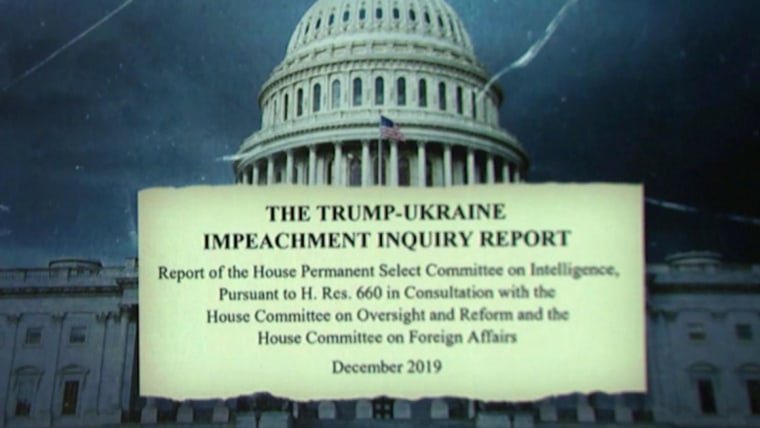The House Intelligence Committee yesterday released its "Trump-Ukraine Impeachment Inquiry Report" with a specific purpose in mind: to summarize the panel's findings -- so far -- in its investigation of Donald Trump and his efforts to extort a vulnerable foreign ally for domestic political assistance. The 300-page document was expected to be brutal, and it was. From the report:
Donald J. Trump, the 45th President of the United States -- acting personally and through his agents within and outside of the U.S. government -- solicited the interference of a foreign government, Ukraine, in the 2020 U.S. presidential election. The President engaged in this course of conduct for the benefit of his reelection, to harm the election prospects of a political opponent, and to influence our nation's upcoming presidential election to his advantage. In so doing, the President placed his personal political interests above the national interests of the United States, sought to undermine the integrity of the U.S. presidential election process, and endangered U.S. national security. [...]Faced with the revelation of his actions, President Trump publicly and repeatedly persisted in urging foreign governments, including Ukraine and China, to investigate his political opponent. This continued solicitation of foreign interference in a U.S. election presents a clear and present danger that the President will continue to use the power of his office for his personal political gain.
There are, of course, complex details among the findings, but at the heart of the report are some core allegations: Trump abused his office to extort Ukraine in the hopes of benefiting from foreign election interference; he undermined U.S. national security; and the American president "ordered and implemented a campaign to conceal his conduct from the public and frustrate and obstruct the House of Representatives' impeachment inquiry."
And while the Intelligence Committee's report -- advanced by the panel last night on a party-line vote -- does not explicitly call on lawmakers to impeach the president, it does serve as a roadmap of sorts for the next phase in the process, fleshing out the evidence of presidential wrongdoing.
And what, pray tell, is the next phase? That begins today in the House Judiciary Committee.
That panel now has the responsibility of reviewing the compiled evidence and deciding whether to draw articles of impeachment against the president. If a majority of the committee's members agree to do so, they'll approve articles in the coming weeks and send them to the House floor for a vote. If one or more of the articles are approved by a simple majority of the chamber, Donald Trump will, in fact, have been impeached -- at which point the Senate will hold an impeachment trial, to be overseen by Supreme Court Chief Justice John Roberts.
The Judiciary Committee phase begins today with a hearing featuring four experts in constitutional law. The White House was invited to participate in the proceedings, but the White House counsel's office said earlier this week that it would, for all intents and purposes, boycott this initial step.
It's possible that Team Trump will eventually want to offer evidence in the president's defense -- a step the White House insisted for weeks was a key priority -- though Trump also this week condemned the entire process as a "hoax," which suggested he and his operation may refuse to participate altogether.
As for his allies on Capitol Hill, it's widely expected that Republicans on the Judiciary Committee will engage in some kind of partisan antics today, though Committee Chairman Jerry Nadler (D-N.Y.), using uncharacteristic language, reportedly told his colleagues yesterday, "I'm not going to take any s**t."
Buckle up.
